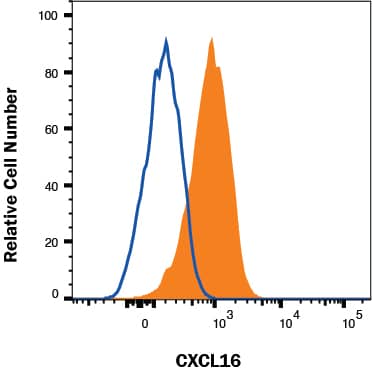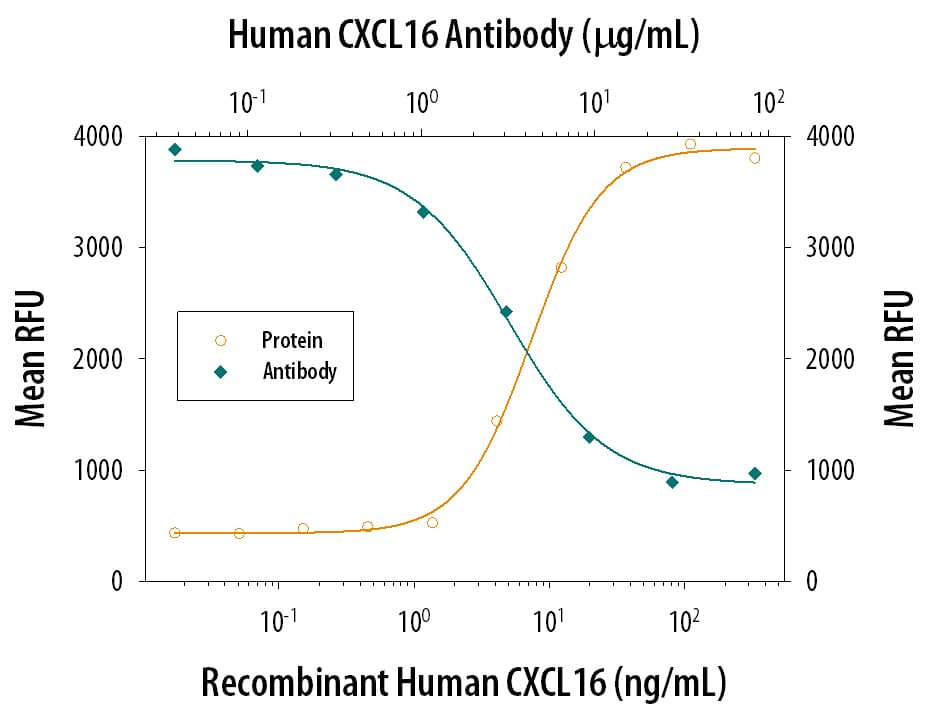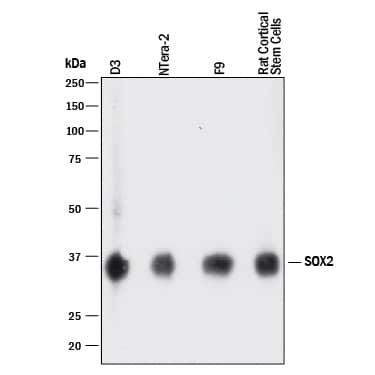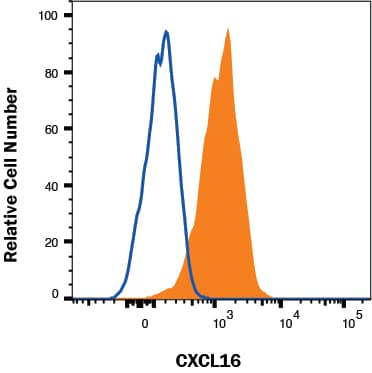Mouse CXCL16 Antibody Summary
Asn27-Pro114
Accession # Q8BSU2
Customers also Viewed
Applications
Mouse CXCL16 Sandwich Immunoassay
Please Note: Optimal dilutions should be determined by each laboratory for each application. General Protocols are available in the Technical Information section on our website.
Scientific Data
 View Larger
View Larger
Chemotaxis Induced by CXCL16 and Neutralization by Mouse CXCL16 Antibody. Recombinant Mouse CXCL16 Chemokine Domain (Catalog # 503-CX) chemoattracts the BaF3 mouse pro-B cell line transfected with mouse CXCR6 in a dose-dependent manner (orange line). The amount of cells that migrated through to the lower chemotaxis chamber was measured by Resazurin (Catalog # AR002). Chemotaxis elicited by Recombinant Mouse CXCL16 Chemokine Domain (7.5 ng/mL) is neutralized (green line) by increasing concentrations of Rat Anti-Mouse CXCL16 Monoclonal Antibody (Catalog # MAB503). The ND50 is typically 0.15-0.6 µg/mL.
Preparation and Storage
- 12 months from date of receipt, -20 to -70 °C as supplied.
- 1 month, 2 to 8 °C under sterile conditions after reconstitution.
- 6 months, -20 to -70 °C under sterile conditions after reconstitution.
Background: CXCL16
Mouse CXCL16 (CXC chemokine 16) is a non-ELR motif-containing CXC chemokine with a transmembrane domain. CX3CL1/Fractalkine andCXCL16 are the only two transmembrane chemokines within the superfamily. Mouse CXCL16 cDNA encodes a 246 amino acid (aa) precursor protein with a putative 26 aa signal peptide, an 88 aa chemokine domain, an 87 aa mucin-like spacer region, a 22 aa transmembrane domain, and a 23 aa cytoplasmic tail. Mouse and human CXCL16 share 49% aa sequence identity. Mouse CXCL16 is produced by dendritic cells in lymphoid organ T cell zones and bycells in the splenic red pulp both as membrane-bound and soluble forms. Based on northern blot analysis, CXCL16 is also expressed in some non-lymphoid tissues such as lung, small intestine and kidney. The receptor for CXCL16 has been identified as CXCR6 (previously called Bonzo, STRL33 or TYMSTR), which is also a coreceptor for HIV entry. CXCR6 is expressed on naive CD8 cells, natural killer T cells and activated CD8 and CD4 T cells.
Product Datasheets
Citations for Mouse CXCL16 Antibody
R&D Systems personnel manually curate a database that contains references using R&D Systems products. The data collected includes not only links to publications in PubMed, but also provides information about sample types, species, and experimental conditions.
16
Citations: Showing 1 - 10
Filter your results:
Filter by:
-
Single-cell RNA transcriptome analysis of CNS immune cells reveals CXCL16/CXCR6 as maintenance factors for tissue-resident T cells that drive synapse elimination
Authors: Sarah F. Rosen, Allison L. Soung, Wei Yang, Shenjian Ai, Marlene Kanmogne, Veronica A. Davé et al.
Genome Medicine
-
Oncogenic collagen I homotrimers from cancer cells bind to alpha 3 beta 1 integrin and impact tumor microbiome and immunity to promote pancreatic cancer
Authors: Chen Y, Yang S, Tavormina J et al.
Cancer cell
-
Modeling NK-cell lymphoma in mice reveals its cell-of-origin and microenvironmental changes and identifies therapeutic targets
Authors: Koya, J;Tanigawa, T;Mizuno, K;Kim, H;Ito, Y;Yuasa, M;Yamaguchi, K;Kogure, Y;Saito, Y;Shingaki, S;Tabata, M;Murakami, K;Chiba, K;Okada, A;Shiraishi, Y;Marouf, A;Liévin, R;Chaubard, S;Jaccard, A;Hermine, O;de Leval, L;Tournilhac, O;Damaj, G;Gaulard, P;Couronné, L;Yasui, T;Nakashima, K;Miyoshi, H;Ohshima, K;Kataoka, K;
Nature communications
Species: Transgenic Mouse
Sample Types: In Vivo
Applications: Neutralization -
Innate acting memory Th1 cells modulate heterologous diseases
Authors: Rakebrandt, N;Yassini, N;Kolz, A;Schorer, M;Lambert, K;Goljat, E;Estrada Brull, A;Rauld, C;Balazs, Z;Krauthammer, M;Carballido, JM;Peters, A;Joller, N;
Proceedings of the National Academy of Sciences of the United States of America
Species: Mouse
Sample Types: In Vivo
Applications: Neutralization -
Sepsis-trained macrophages promote antitumoral tissue-resident T cells
Authors: Broquet, A;Gourain, V;Goronflot, T;Le Mabecque, V;Sinha, D;Ashayeripanah, M;Jacqueline, C;Martin, P;Davieau, M;Boutin, L;Poulain, C;Martin, FP;Fourgeux, C;Petrier, M;Cannevet, M;Leclercq, T;Guillonneau, M;Chaumette, T;Laurent, T;Harly, C;Scotet, E;Legentil, L;Ferrières, V;Corgnac, S;Mami-Chouaib, F;Mosnier, JF;Mauduit, N;McWilliam, HEG;Villadangos, JA;Gourraud, PA;Asehnoune, K;Poschmann, J;Roquilly, A;
Nature immunology
Species: Mouse
Sample Types: In Vivo
Applications: In vivo assay -
LSD1 drives intestinal epithelial maturation and controls small intestinal immune cell composition independent of microbiota in a murine model
Authors: Díez-Sánchez, A;Lindholm, HT;Vornewald, PM;Ostrop, J;Yao, R;Single, AB;Marstad, A;Parmar, N;Shaw, TN;Martín-Alonso, M;Oudhoff, MJ;
Nature communications
Species: Transgenic Mouse
Sample Types: In Vivo
Applications: Neutralization -
Mucosal-associated invariant T cells contribute to suppression of inflammatory myeloid cells in immune-mediated kidney disease
Authors: Gnirck, AC;Philipp, MS;Waterhölter, A;Wunderlich, M;Shaikh, N;Adamiak, V;Henneken, L;Kautz, T;Xiong, T;Klaus, D;Tomczyk, P;Al-Bahra, MM;Menche, D;Walkenhorst, M;Lantz, O;Willing, A;Friese, MA;Huber, TB;Krebs, CF;Panzer, U;Kurts, C;Turner, JE;
Nature communications
Species: Mouse
Sample Types: In Vivo
Applications: In Vivo -
Targeting CXCL16 and STAT1 augments immune checkpoint blockade therapy in triple-negative breast cancer
Authors: B Palakurthi, SR Fross, IH Guldner, E Aleksandro, X Liu, AK Martino, Q Wang, RA Neff, SM Golomb, C Lewis, Y Peng, EN Howe, S Zhang
Nature Communications, 2023-04-13;14(1):2109.
Species: Mouse
Sample Types: Whole Tissues
Applications: IHC -
Targeting cardiomyocyte ADAM10 ectodomain shedding promotes survival early after myocardial infarction
Authors: E Klapproth, A Witt, P Klose, J Wiedemann, N Vavilthota, SR Künzel, S Kämmerer, M Günscht, D Sprott, M Lesche, F Rost, A Dahl, E Rauch, L Kattner, S Weber, P Mirtschink, I Kopaliani, K Guan, K Lorenz, P Saftig, M Wagner, A El-Armouch
Nature Communications, 2022-12-10;13(1):7648.
Species: Mouse
Sample Types: Cell Lysates
Applications: Western Blot -
Inflammation triggers ILC3 patrolling of the intestinal barrier
Authors: A Jarade, Z Garcia, S Marie, A Demera, I Prinz, P Bousso, JP Di Santo, N Serafini
Nature Immunology, 2022-08-23;0(0):.
Species: Mouse
Sample Types: In Vivo
Applications: In Vivo -
Phosphodiesterase 5 (PDE5) Is Highly Expressed in Cancer-Associated Fibroblasts and Enhances Breast Tumor Progression
Authors: S Catalano, S Panza, G Augimeri, C Giordano, R Malivindi, L Gelsomino, S Marsico, F Giordano, B Gy?rffy, D Bonofiglio, S Andò, I Barone
Cancers (Basel), 2019-11-06;11(11):.
Species: Mouse
Sample Types: Whole Cells
Applications: Neutralization -
Response patterns of cytokines/chemokines in two murine strains after irradiation.
Authors: Zhang M, Yin L, Zhang K, Sun W, Yang S, Zhang B, Salzman P, Wang W, Liu C, Vidyasagar S, Zhang L, Ju S, Okunieff P, Zhang L
Cytokine, 2012-01-25;58(2):169-77.
Species: Mouse
Sample Types: Plasma
Applications: Luminex Development -
Excreted urinary mediators in an animal model of experimental immune nephritis with potential pathogenic significance.
Authors: Wu T, Xie C, Bhaskarabhatla M, Yan M, Leone A, Chen SS, Zhou XJ, Putterman C, Mohan C
Arthritis Rheum., 2007-03-01;56(3):949-59.
Species: Mouse
Sample Types: In Vivo
Applications: Neutralization -
A disintegrin and metalloproteinase 10-mediated cleavage and shedding regulates the cell surface expression of CXC chemokine ligand 16.
Authors: Gough PJ, Garton KJ, Wille PT, Rychlewski M, Dempsey PJ, Raines EW
J. Immunol., 2004-03-15;172(6):3678-85.
Species: Mouse
Sample Types: Cell Culture Supernates, Whole Cells
Applications: ELISA Development, Flow Cytometry -
CXCL16/CXCR6 Axis Drives Microglia/Macrophages Phenotype in Physiological Conditions and Plays a Crucial Role in Glioma
Authors: Lepore F, D'Alessandro G, Antonangeli F et al.
Front Immunol
-
Role of MR1-driven signals and amphiregulin on the recruitment and repair function of MAIT cells during skin wound healing
Authors: Anastasia du Halgouet, Aurélie Darbois, Mansour Alkobtawi, Martin Mestdagh, Aurélia Alphonse, Virginie Premel et al.
Immunity
FAQs
No product specific FAQs exist for this product, however you may
View all Antibody FAQsIsotype Controls
Reconstitution Buffers
Secondary Antibodies
Reviews for Mouse CXCL16 Antibody
Average Rating: 5 (Based on 1 Review)
Have you used Mouse CXCL16 Antibody?
Submit a review and receive an Amazon gift card.
$25/€18/£15/$25CAN/¥75 Yuan/¥2500 Yen for a review with an image
$10/€7/£6/$10 CAD/¥70 Yuan/¥1110 Yen for a review without an image
Filter by:

















